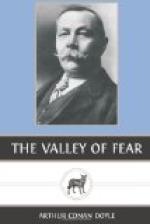There was yet another individual whose residence under that roof was, it is true, only an intermittent one, but whose presence at the time of the strange happenings which will now be narrated brought his name prominently before the public. This was Cecil James Barker, of Hales Lodge, Hampstead.
Cecil Barker’s tall, loose-jointed figure was a familiar one in the main street of Birlstone village; for he was a frequent and welcome visitor at the Manor House. He was the more noticed as being the only friend of the past unknown life of Mr. Douglas who was ever seen in his new English surroundings. Barker was himself an undoubted Englishman; but by his remarks it was clear that he had first known Douglas in America and had there lived on intimate terms with him. He appeared to be a man of considerable wealth, and was reputed to be a bachelor.
In age he was rather younger than Douglas—forty-five at the most—a tall, straight, broad-chested fellow with a clean-shaved, prize-fighter face, thick, strong, black eyebrows, and a pair of masterful black eyes which might, even without the aid of his very capable hands, clear a way for him through a hostile crowd. He neither rode nor shot, but spent his days in wandering round the old village with his pipe in his mouth, or in driving with his host, or in his absence with his hostess, over the beautiful countryside. “An easy-going, free-handed gentleman,” said Ames, the butler. “But, my word! I had rather not be the man that crossed him!” He was cordial and intimate with Douglas, and he was no less friendly with his wife—a friendship which more than once seemed to cause some irritation to the husband, so that even the servants were able to perceive his annoyance. Such was the third person who was one of the family when the catastrophe occurred.
As to the other denizens of the old building, it will suffice out of a large household to mention the prim, respectable, and capable Ames, and Mrs. Allen, a buxom and cheerful person, who relieved the lady of some of her household cares. The other six servants in the house bear no relation to the events of the night of January 6th.
It was at eleven forty-five that the first alarm reached the small local police station, in charge of Sergeant Wilson of the Sussex Constabulary. Cecil Barker, much excited, had rushed up to the door and pealed furiously upon the bell. A terrible tragedy had occurred at the Manor House, and John Douglas had been murdered. That was the breathless burden of his message. He had hurried back to the house, followed within a few minutes by the police sergeant, who arrived at the scene of the crime a little after twelve o’clock, after taking prompt steps to warn the county authorities that something serious was afoot.




